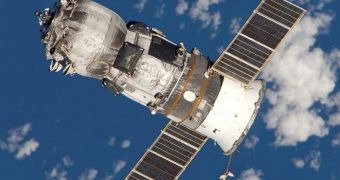Officials at the Russian Federal Space Agency (RosCosmos) say that the newest Russian unmanned space capsule, Progress 39, will launch today, September 10, from Kazakhstan.
The spacecraft was originally scheduled to take to the skies on Wednesday, but a glitch forced flight controllers and mission planners to abort the launch attempt, and delay it by 48 hours.
The Progress cargo carrier is now scheduled to take off at 6:22 am EDT, from the Site 1/5 launch pad at the Baikonur Cosmodrome, in the steppes of Kazakhstan.
Hopes are high that today's launch attempt will be successful, and that the weather will allow for a successful departure. Strong winds on Wednesday made deterred engineers from trying to launch the capsule.
The spacecraft, which carries supplies for the six-astronaut crew aboard the International Space Station (ISS), will be delivered to orbit aboard a Soyuz-U rocket, RosCosmos announced.
According to the current flight manifest, the capsule carries about 110 pounds of oxygen, 375 pounds of water, 1,918 pounds of propellant for the ISS' thrusters, and 2,645 pounds of spare parts, experiment hardware and other supplies.
Given the delay, Progress 39 is now scheduled to dock to the aft port of the Russian-built Zvezda module at around 7:58 am EDT, on Sunday, September 12.
The predecessor to this capsule, called Progress 38, was deorbited on September 5, after having separated from the ISS a few days before.
Before reentering Earth’s atmosphere, it conducted a few scientific experiments, which is precisely what the new capsule will do when its service life aboard the station will conclude.
After all the cargo is unloaded from the spacecraft, astronauts generally fill it with garbage and other debris, and then seal it up again.
The capsule is then separated from the $100 billion orbital facility, and remains in orbit for a few extra days, before being redirected so that it burns up in Earth's atmosphere.
In the future, officials at RosCosmos have plans to convert the Progress to a capsule capable of reentering the atmosphere without suffering damage.
The capsule is part of an international program to resupply the ISS, which also features spacecrafts operated by the European Space Agency and JAXA, Space Fellowship reports.

 14 DAY TRIAL //
14 DAY TRIAL //